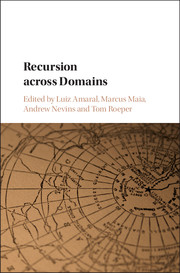
A book edited by Luiz Amaral, Marcus Maia, Andrew Nevins, and Tom Roeper on “Recursion across Domains” was recently published by Cambridge University Press. As Tom Roeper notes:
This book has a large UMass footprint — editors: Luiz Amaral, Tom Roeper — contributors include many former students, faculty and visitors: Suzi Lima, Bart Hollebrandse, Ana Perez, Uli Sauerland, Yohei Oseki, Terue Nakato, Rafael Nonato, Luiz Amaral, Tom Roeper
Summary: Recursion and self-embedding are at the heart of our ability to formulate our thoughts, articulate our imagination and share with other human beings. Nonetheless, controversy exists over the extent to which recursion is shared across all domains of syntax. A collection of 18 studies are presented here on the central linguistic property of recursion, examining a range of constructions in over a dozen languages representing great areal, typological and genetic diversity and spanning wide latitudes. The volume expands the topic to include prepositional phrases, possessives, adjectives, and relative clauses – our many vehicles to express creative thought – to provide a critical perspective on claims about how recursion connects to broader aspects of the mind. Parallel explorations across language families, literate and non-literate societies, children and adults are investigated and constitutes a new step in the generative tradition by simultaneously focusing on formal theory, acquisition and experimentation, and ecologically-sensitive fieldwork, and initiates a new community where these diverse experts collaborate
Table of Contents:
Foreword (Ian Roberts)
A Map of the Theoretical and Empirical Issues (Amaral, Maia, Roeper, & Nevins)
Speech Reports, Theory of Mind and Evidentials
- Sauerland, Uli. False speech reports in Piraha ?: A comprehension experi- ment
- Hollebrandse, Bart. Indirect recursion: the importance of second-order embedding and its implications for cross-linguistic research
- Correa, Let?cia M.S., Marina R. A. Augusto, Mercedes Marcilese & Clara Villarinho. Recursion in language and the development of higher order cognitive functions: an investigation with children acquiring Brazilian Portuguese
- Stenzel, Kristine. Embedding as a building block of evidential categories in Kotiria
- Thomas, Guillaume. Embedded imperatives in Mbya ?
Recursion along the Clausal Spine
- Rodrigues, Cilene, Raiane Salles, & Filomena Sandalo. Word order in control: evidence for self-embedding in Piraha ?
- Nonato, Rafael. Switch-reference is licensed by both kinds of coordina- tion: novel K?iseˆdjeˆ data
- Duarte, Fabio. Clausal recursion, predicate raising and head-finality in Teneteha ?ra
- Vieira,Marcia.Recursion in Tupi-Guaranilanguages:TheCasesofTupinamba ? and Guaran ??
Recursive Possession and Relative Clauses
- Terunuma, Akikio & TerueNakato.Recursive possessives in ChildJapanese
- Lima, Suzi, & Pikuruk Kaiabi. Recursion of possessives and locative phrases in Kawaiwete
- Amaral, Luiz. & Wendy Leandro. Relative Clauses in Wapichana and the interpretation of multiple embedded “uraz” Constructions
- Storto, Luciana, Karin Vivanco, & Ivan Rocha. Multiple embedding of relative clauses in Karitiana
Recursion in the PP Domain
- Roeper,Tom & YoheiOseki.Directstructuredrecursionintheacquisition path from flat to hierarchical structure
- Sandalo, Filomena, Cilene Rodrigues, Tom Roeper, Luiz Amaral, Marcus Maia & Glauber Romling. Self-embedded recursive postpositional phrases in Piraha ?: a pilot study
- Perez-Leroux, Ana T., Anny Castilla-Earls, Susana Bejar, Diane Massam & Tyler Peterson. Strong continuity and children’s development of DP recursion
- Franchetto, Bruna. Prosody and recursion in Kuikuro: DPs vs PPs
- Maia,Marcus,Anieli Franca, AlineGesualdi, AleriaLage, Cristiane Oliveira, Marije Soto & Juliana Gomes. The processing of PP embedding and co- ordination in Karaja ? and in Portuguese
